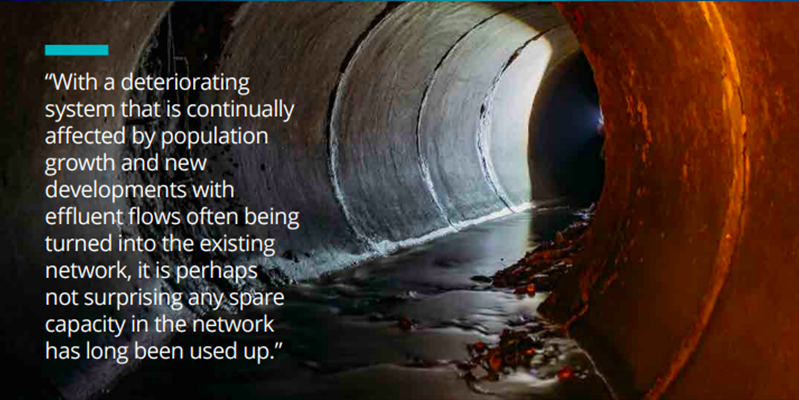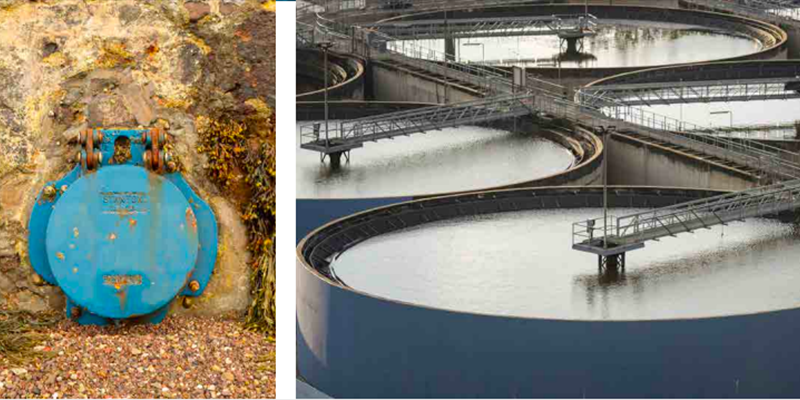"Political will must refocus on sewers"
Publicerad: 30 november, 2021

A comment by Ian Clarke, Editor-in-Chief Trenchless Works
Sitting as I do somewhat on the periphery of the UK water industry it is often interesting to watch the development of the ‘topic of the day’. This has recently been very much the case with the furore over raw sewage ‘dumping’ into rivers and coastal areas.
Over recent weeks the media in general, including print, broadcast and internet outlets have picked up on some Environment Agency numbers that indicate that some 400,000 pollution incidents have occurred throughout the UK in 2020.
What many of the recent reports do not show however is that untreated effluent, including human waste, wet wipes and condoms as well as household bleaches, detergents etc, were released into waterways and coastal areas for more than three million hours in 2020.
Commentators have highlighted that the main function of OFWAT over the past 30 years has in essence been consumer protection in terms of price rise moderation given the monopolistic nature of the water industry set-up, whilst still enabling water companies to invest to a significant extent and remain commercially attractive to investors. With this in mind there are various other factors that may not also be apparent.
The water sector was in essence privatised so that funds could be raised to complete necessary works over time against future income, which given the ‘captive audience’ of Water Companies was pretty much a guaranteed income.
However, as private companies those in charge also had to ensure that returns for investors were attractive enough to maintain share prices and provide the expected levels of dividends, otherwise no investors, no company. So, profits were also a driving force.
The industry was then hit by a series of largely political requirements that drove funding into certain quite specific areas which were directed by regulatory requirements from OFWAT at the time, targets which the Water Companies had to meet.
This regulatory requirement, over the 30 years of privatisation, has generally led to an attitude of more aligned with meeting set targets rather than achieving the infrastructure replacement and rebuild that was actually necessary, hence the sewer network underspend. This now means that a sewer network that at the time of privatisation, had an expected life of around 200 to 400 years, now has a life expectancy of what is now claimed to be 1,000+ years. At the same time there has been around a 20% increase in UK population since 1990, which will have added significantly to current foul flows into the existing sewer network as compared with 30 years ago.
WHY THE SEWER SPEND SHORTFALL?
In the early years of privatisation, European Clean Water Directives required improvement to coastal bathing waters and beaches, due largely to the amount of raw sewage that was being allowed to flow directly into water courses and coastal areas, causing pollution problems. At this time, it may have been more sensible to look at the failing UK sewer network and upgrade this as it was a major contributor to the bathing water problem, alongside ageing wastewater treatment plants which were being overwhelmed by the increasing flow rates from failing sewers. However, the time frame required for the improvements in the Directives meant that this would not achieve the desired political outcome. So, resources were spent on new-build treatment plants or existing treatment plant upgrades to provide the required clean effluent outcomes and cleaner beaches. The sewer network problems were side-lined but the cleaner beaches requirement was achieved, if at a very significant cost. To some extent the investment at that time might be viewed as something of a costly ‘sticking plaster’.
At about this time also, there were instances of drought across parts of the country that highlighted the water supply leakage problem with some +30%, if not more, treated water losses in the water distribution system. The political wind not surprisingly moved from focusing on cleaner beaches and bathing water (the job having supposedly been done with blue flags being achieved countrywide), to reducing drinking water leakage, an aspect of the industry that is still being addressed today with on average a figure of 20% losses currently being quoted for the sector.
There are those that have tried to lay the blame for failures on the Water Company employees, but the workforce can only work with the budgets they are given.
With a deteriorating system that is continually affected by population growth and new developments with effluent flows often being turned into the existing network, it is perhaps not surprising any spare capacity in the network has long been used up.
There has also been accusation that there has been some complex financial engineering to maintain investor viability rather than network spend but this perhaps is a tale for another day.
CHANGING CHALLENGES
Now with climate change at last being recognised as the present and future problem for humanity and the weather pattern changes that are already being experienced because of it, the political wind is moving towards wastewater pollution. Just a minute, have we not been here before?
Yes, there has been a major and long-term shortfall in investment by Water Companies towards sewers and pollution prevention and now this has to be addressed. However, to think that the lack of investment has been a deliberate unilateral action by the Water Companies is something of a misconception. There have been accusations that the attitude of ‘if it ain’t broke don’t fix it’ exists and this has not been helped by the transfer of private sewers into water company hands in 2011. Prior to and subsequent to this, knowledge of what water companies actually own and the state of its repair had and remains limited in some cases and where works on the sewer networks have been undertaken much of it has been more reactive than proactive.
The Water Companies have in truth worked on the problems within the pricing and investment regimes allowed them by OFWAT over the past 30 years, which has not left much remaining for areas like the sewer network. These regimes however have been significantly driven by the political climate of the times and other areas have not always been in the Companies’ powers to address as they have been required by the regulator and Government level directives (irrespective of the political colour of the day) to address specific problems, maybe not in a way that might have been the best engineering option but which have, by circumstances and political necessity, been imposed on them. Therefore, the drivers behind the lack of investment in the sewer sector have probably been as much political as they have practical.
It also does not however appear that the lessons have, as yet been fully learned. As this piece is being written the UK Government passed a Bill that would allow Water Companies to continue to dump raw sewage into rivers and this despite amendments from The House of Lords to prevent it. The Environment Bill amendments would have placed legal duties on Water Companies to reduce such discharges. According to reports this was passed because “MPs say that safeguards already exist and that new measures would cost billions”.
Once again, we see the financial driver seemingly outweighing the practical and environmental drivers. However, in the ensuing days, with public pressure, social media fury and potential rebellion amongst some MPs, there was a change of mind and a further announcement that the Water Companies would be expected to show, over the next five-year price review period, a ‘progressive reduction’ in pollution incidents of this kind, although what level of progression and how it was to be achieved has yet to be mentioned.
Climate change has also brought the wastewater networks back into focus as extreme weather events appear to be increasing not just in the UK but globally. Therefore, the next OFWAT Price Review must look significantly at taking the changing expectations of rainfall and population growth and public opinion into account so as to correctly adjust spending on the sewer network. But it must be borne in mind that ‘Rome was not built in a day’ and that to make up the shortfall that has happened over the past 30 years and more will take time. Time some would say we do not have.
THE WAY FORWARD?
To date, Water Companies have spent billions on works across the water and wastewater networks, even though recent reports do not seem to have mentioned much of this. But, to do the work now required will take many billions more. This cannot simply be placed on consumer shoulders but by the same token cannot be placed totally on the Water Companies either, they still have to remain viable to investors, even though they have asked to have this new regulatory requirement placed on them to solve the raw sewage dumping problems.
It must be remembered that even if Net Zero is achieved completely across the globe by 2030, 2040 or 2070, extreme weather events will continue for some significant time to come and are likely to get worse before they better. Net Zero in truth is the starting point to achieve reversal in extreme weather patterns not an end point! So, any UK sewer network improvements will have to have vastly increased ‘storage’ capacity to handle the outpourings from these events. It will not simply be a case of improve a bit on what is already there.
From a practical point of view this should create significant workload for the trenchless technology sector as much of the works could be undertaken at minimal environmental impact and at lower cost over a shorter timeframe than with more traditional techniques.
However, National finances are at best in disarray post-pandemic and workforces are suffering post-Brexit in some areas, so it may be that the UK Government will need to come up with some inventive ways to support the water industry over a considerable timeframe in an effort to ensure the necessary works are completed to the level required. There will also be a need across the water sector to highlight the fact that to invest in the necessary infrastructure there will likely be a reduction in investor returns over a number of years if not decades. So, any investment in the UK Water sector will be a long-term commitment. Remember however that Government managed to support the Banking industry through some of its worst times, perhaps now the focus must shift to the water industry in similar fashion. However, there will need to be a significant shift in the political wind before this will happen.
There also needs to be an understanding that the Water Companies and their skilled engineers must be allowed to solve the raw sewage dumping problem by working on the right parts of the network and not be made to use another ‘sticking plaster’ option that simply satisfies pressure groups and public opinion today. Any other option would mean a system that will not be able to handle the future flows potentially coming from extreme weather events. Without this move there will likely be falling living standards, higher costs for things like insurance, if it is available at all, and in the public’s perception the idea that renationalisation might be the better option.
With COP26 now finished and agreements made, there is the suggestion from some analysts that whilst these commitments mean that ‘1.5 is still alive’ as a global temperature rise target, practically if all commitments are fully met the rise is more likely to be 1.8o C. Others have however noted that given the previous success rates of commitment versus effective action, the realistic temperature rise could be as high as 2.4o C. The potential weather changes that would bring really could mean that serious problems for any sewer system over the next 50 to 100 years unless it is addressed starting now!
